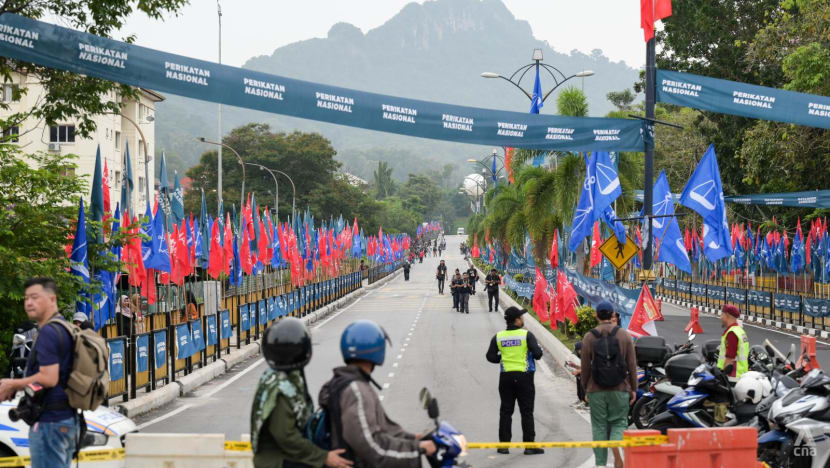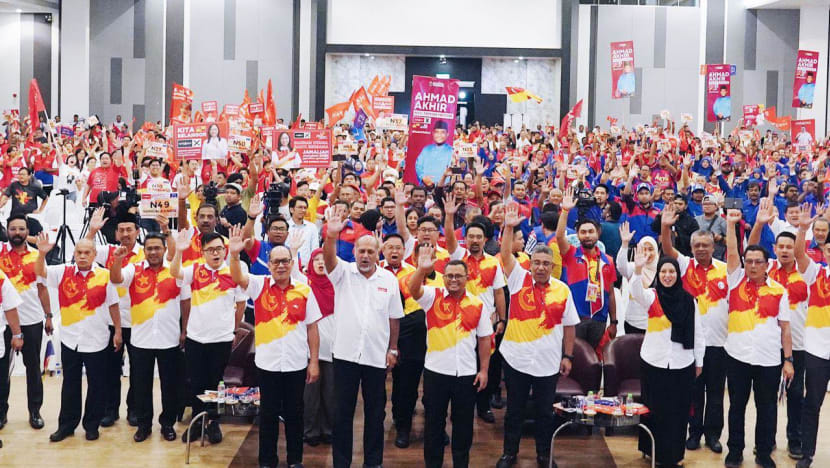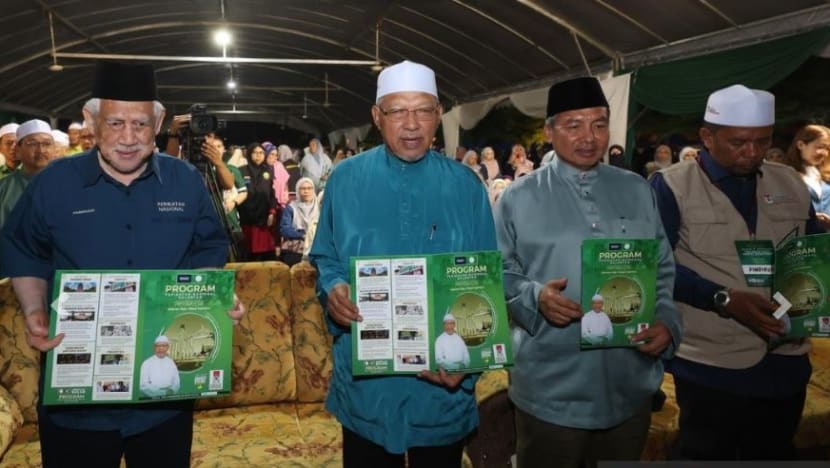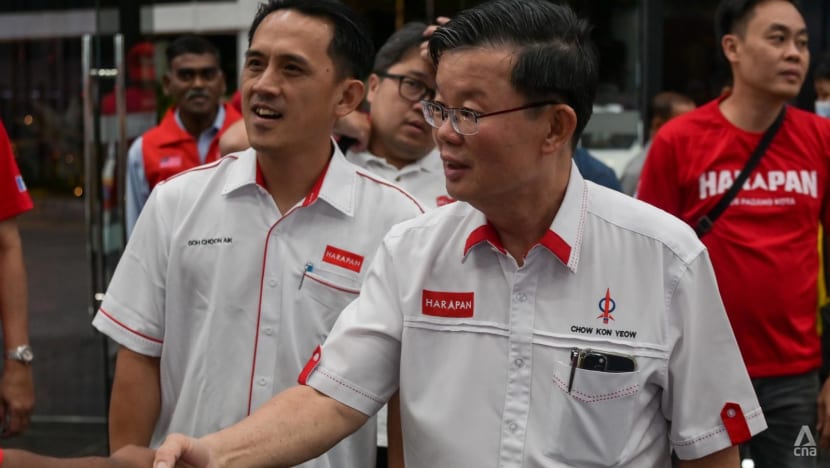Malaysia state polls: Coalitions unveiling manifestos to win votes but analysts say emotive rhetoric matters more than promises
The main coalitions have begun to unveil electoral promises across the six states. However, observers CNA spoke to maintain that fence voters are more likely to be swayed by emotive rhetoric than policy debate.

Party flags seen near a nomination centre Sungai Pusu, Selangor, on Jul 29, 2023, ahead of Malaysia's state elections. (Photo: CNA/Fadza Ishak)
KUALA LUMPUR: As campaigning efforts heat up for Malaysia’s state elections, the main coalitions have begun unveiling manifestos in their bids to canvass support from voters.
But analysts speaking to CNA stress that electoral promises and policy debates outlined in the manifestos are unlikely to matter significantly in garnering support from voters.
Instead, voters, especially the majority in the rural heartland, are more likely to be drawn to emotive campaign rhetoric and racial issues, they add.
Residents from six states - Selangor, Kelantan, Terengganu, Negeri Sembilan, Kedah and Penang - will vote for lawmakers in the state assemblies on Aug 12.
The Pakatan Harapan (PH) - Barisan Nasional (BN) alliance, which is part of the federal unity government under Prime Minister Anwar Ibrahim, has launched election manifestos for Penang and Selangor. PH is the incumbent state government for both these states.
Meanwhile, the Perikatan Nasional coalition, which forms the opposition in the federal government, has also launched its manifesto for the east coast states of Kelantan and Terengganu, both strongholds for PN component party Parti Islam Se-Malaysia (PAS).
PH-BN and PN are expected to reveal electoral promises and manifesto documents for the remaining states for the remainder of the campaign.

PROMISES AND PLEDGES
In short, the promises encompass economic goodies for lower income residents, employment opportunities, as well as pledges to improve transport connectivity as well as improving public amenities such as access to clean water.
BowerGroup Asia director Asrul Hadi Abdullah Sani told CNA that while policy debate and analysis of electoral promises should form a core part of the campaign, he acknowledged that reality is quite different.
“Unfortunately, policy debate and discourse are not the norm in election campaigns. This is why political parties need to go down on the ground and ensure that their manifestos are translated at every level of society,” said Asrul.
“It is very unlikely that a majority of the voters will decide based on the respective manifestos but instead on personalities and emotive rhetoric,” he added.
Political analyst James Chin, Professor of Asian Studies at the University of Tasmania and Senior Fellow at the Jeffrey Cheah Institute on Southeast Asia, echoed similar sentiments.
He told CNA: “Election manifestos are not important in the overall scheme of things in Malaysia politics. People only look at the front page of newspapers and consider the big headlines but not the specific details of the manifestos.
Mr Lim Guan Eng, chairman of PH component party Democratic Action Party (DAP), acknowledged that talking about economic programmes was “not as exciting for voters as compared to fiery speeches touching on race and religion”.
However, the former Malaysian finance minister and ex-chief minister of Penang maintained that it was the right move for PH-BN to list down electoral promises anyway.
“At the end of the day, you're talking about brick and mortar. The economy, the country is built on brick and mortar, step by step, painfully and diligently. So this is something that any responsible government will do,” he told CNA on Wednesday.
RURAL VOTERS MOTIVATED BY RELIGIOUS RHETORIC
Analysts also say voters in the rural heartland are more likely to be persuaded by race and religious rhetoric, rather than policy debate.
In announcing its manifesto for Kelantan, the state’s caretaker chief minister Ahmad Yakob listed 18 programmes which centred around socio-economic development and clean water supply.
"What we are offering is also according to the state's capabilities after holding discussions, and hoping that the people will continue to maintain PAS rule in Kelantan," he was quoted as saying by Malay daily Berita Harian.
For Terengganu, PN launched its manifesto on July 8, with their caretaker minister Ahmad Samsuri Mokhtar offering carrots such as interest-free loans, completion of a road between two coastal towns and an allocation of RM100 million (US$22.03milllion) to make the state one of Malaysia’s leading producers of food.
Prof Chin asserted that the promises made by PN in Kelantan and Terengganu were mostly “motherhood statements” which lacked substance.
“Manifestos don't play an important role in rural areas but they may matter slightly in urban areas as the middle class are more likely to examine the promises,” said Prof Chin.
He added that for PN, whose voter base was the Malays living in the heartland areas, it was “no surprise” that the manifesto lacked clarity.
“In places like Kelantan, Terengganu, the personal touch, as well as race and religious factors matter more,” he added.
However, information chief for Parti Pribumi Bersatu Malaysia (Bersatu) Razali Idris told CNA that it was reductive to say that PN does not prioritise election manifestos.
“If you don’t have (manifesto), then what is the use of contesting? However, these offers have to be realistic and according to your ability. That is why PAS Terengganu could fulfill their 20 promises in the last elections. And now, we have added another 10 promises for this year’s elections. It doesn’t look big but we do it according to our capabilities,” he said.
He also claimed that when PH was the opposition, it had also made big promises in the past such as reducing the price of fuel and the price of things.
“These are populists and impossible to achieve, regardless whoever is at the helm. If you want to make promises, you have to fulfill all of them,” said Mr Razali who is contesting the Kijal state seat in Terengganu for the upcoming polls.

URBAN VOTERS ARE MORE POLITICAL LITERATE
In an interview with CNA, political analyst Dr Sivamurugan Pandian of Universiti Sains Malaysia (USM) highlighted that in urban states such as Selangor, Negeri Sembilan and Penang, manifestos could be a plus point for political parties who want to show off their track record as the political literacy is higher.
“In areas such as Selangor, Negeri Sembilan and Penang, it could play an important role as it involves upper and middle-class voters who are looking whether certain issues are addressed by those contesting.
“That’s why I think in Selangor and Penang, (PH) have launched their manifestos to show that they have fulfilled certain things while some are still ongoing,” he said.
In Selangor, PH-BN’s manifesto includes providing 100,000 high-income jobs to the youth of Selangor, making the state a premier investment destination in Southeast Asia and fully digitising government services.
Other offers include 200,000 homes that cost below RM250,000, reducing traffic congestion in the state and expanding its social welfare programmes.
Caretaker Selangor chief minister Amirudin Shari said during the launch of the manifesto on Monday: “This coalition has a clear plan and a specific mission for the people of Selangor.
“This is unlike our opponents who until now we haven’t heard of their plans. They only know how to use religious and racial sentiments, sow hatred, and slandering.”

Meanwhile in Penang, incumbent chief minister Chow Kon Yeow announced on Tuesday (Aug 1) that the BN-PH alliance pledged that it will construct affordable housing units for the lower income, the development of a RM200 million global business centre dubbed “GBS By the Sea” to attract investment as well as oversee construction of the Penang Light Rail Transit (LRT) if given the mandate to govern the state.
BowerGroup Asia director Asrul Hadi Abdullah Sani told CNA that as a whole, election manifestos are more pivotal for the PH-BN alliance than the PN coalition.
“A manifesto proposing social, economic, and development promises is vital for the unity coalition to divert the election campaign away from the issues of race and religion, which are Perikatan Nasional’s bread and butter,” said Asrul.
He explained that the key issues impacting the average voter in the Malay heartland are access to economic opportunity, unemployment, competitive wages, home ownership, and poverty.
However, Mr Asrul stressed that PN’s manifesto promises are not new and illustrate their focus is mainly on creating doubt and moving Malay support against Anwar Ibrahim.
“If the unity coalition is not able to address the realities faced by the rural Malay voters, then it would be challenging to capture the confidence and win the support away from PN,” he added.














.jpg?itok=7j-kYZI-)




